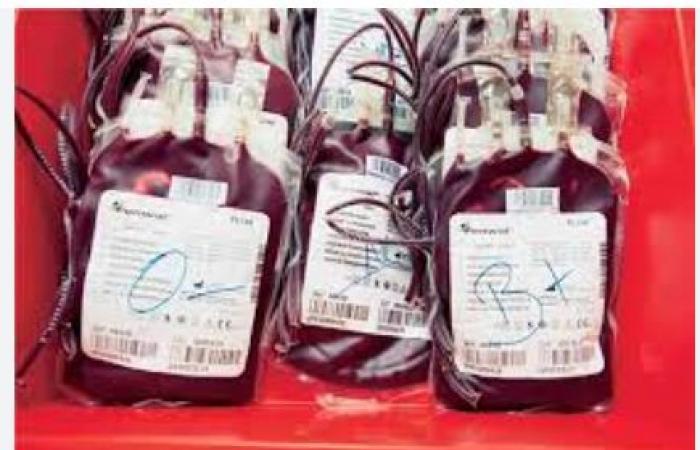Soon calls will multiply for blood donations in the various health structures across the country. Ramadan and Lent coincide this year and will start at the same time, within a few days and during the month of March. A situation which risks having a negative effect on blood collection during this period. The country records an annual deficit of 60,000 blood bags and periods of fasting worsen the deficit.
Senegal still has a deficit in the availability of blood in the country’s various health structures. Every year, the country records a gap of 60 thousand blood bags to meet the demand of the population in order to save lives. Information given by the director of the National Blood Transfusion Center of Senegal (Cnts), Professor Saliou Diop. For the professor who spoke in one of these speeches, “Senegal’s annual demand for blood is estimated at 170,000 bags. Only 110 thousand are collected across the national territory in 2021“. The blood donation management policy is regulated in Senegal and is entrusted to the National Blood Transfusion Center (Cnts) which is responsible for collection, processing and distribution.
But as part of this management, the Cnts is faced with several difficulties including collection. Despite the call for people of good will to come regularly to donate a little blood to save lives, demand remains higher than supply.
In health structures, patients experience the phenomenon of permanent referral, due to lack of availability of blood leading to loss of human life. Even if in recent days there has been a lull in urgent requests for the organization of blood collection initiated by authorities on the national territory, this situation of shortage risks getting worse with the start of the Muslim and Catholic fast, planned for these two religious communities for the months of February-March. This period of fasting is considered a period of relaxation which reduces the availability of blood in the country due to the scarcity of donors who, in the majority, observe these moments of diet. This year, again, Muslims and Catholics will begin together this journey of faith which risks having negative repercussions on the blood bank if the actors do not take measures now to strengthen the achievements.
According to Mohamed Cissé, member of the blood donors association: “each period of Ramadan, the Catholic community took over. Collections are organized either at the National Blood Transfusion Center or in the communities through the activities carried out. This year, this option may not be possible and arrangements will have to be made very quickly to avoid experiencing the phenomena of previous years with urgent calls for mobilization to supply the blood bank.
-Remember that the President of the Republic promulgated Law 2020-26 relating to blood transfusion and blood-derived medicines, the executors of which remain the National Blood Transfusion Center (CNTS), the Regional Blood Transfusion Centers (CRTS), the Transfusion Stations blood (PTS) and Blood deposits (DS). However, it should be noted that the Army health service is also authorized to operate transfusion structures, in accordance with the conditions of practice defined in the referenced law. However, in implementation, some regions do not have a regional blood transfusion center.
Diseases requiring the presence of blood
In Senegal, anemia and hemorrhages constitute one of the greatest causes of morbidity and mortality. In gynecology-obstetrics, hemorrhages are the leading cause of maternal mortality (28%) than in surgery, internal medicine and pediatrics. A situation which is justified by blood transfusion which remains the essential condition for carrying out the medical procedure. The promotion of blood transfusion services, as well as the formulation and implementation of the national blood transfusion policy were recommended by the World Health Organization (WHO) in 1975 and 1994 respectively, in order to ensure maximum transfusion safety in the face of the threat posed by the HIV/AIDS pandemic. However, despite its long history in transfusion practices and the numerous achievements in this area, Senegal has not yet developed and validated a formalized national blood transfusion policy document, authorities report. “The establishment of such a national blood transfusion policy is justified by the need to ensure good availability of different blood products throughout the territory, to strengthen the organization of the blood transfusion system in order to obtain a better cost/effectiveness ratio, and finally to ensure better transfusion safety through the recruitment of voluntary blood donors, the biological qualification of blood donations, the adequate preparation of qualities”, we note in the work of university research Cheikh Anta Diop on the issue.
DENISE ZAROUR MEDANG






